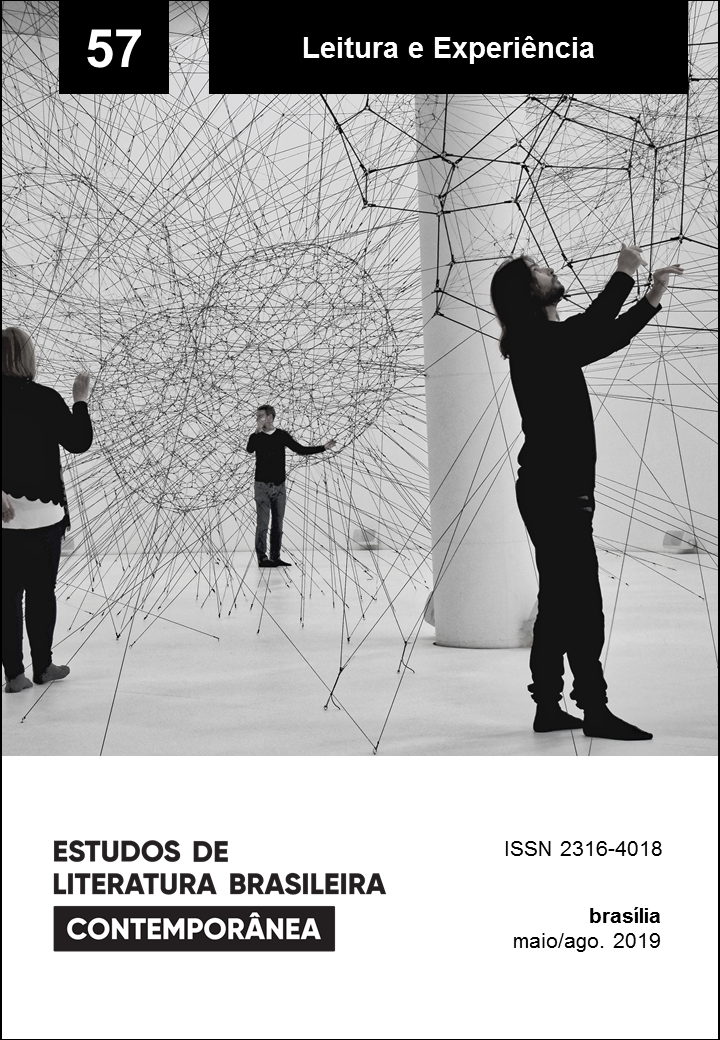New and old luminosities
DOI:
https://doi.org/10.1590/2316-4018574Keywords:
search, new luminosities, readingAbstract
The objective of this text is to analyze the act of reading intertwined with Lacan's concepts of the gaze and objet petit a. The text is divided into three parts. The first part presents Lacan's ideas about object a, the gaze and the search for that object. The second attempts to show that the so-called new technologies are associated with a kind of active lethargy, which implies the dangerous occurrence of a discard culture embodied in the memory cards of those devices. The third part discusses, based on the ideas presented in preceding sections, how reading can take place in the classroom through the use of new or old luminosities.
References
BANDEIRA, Manoel (1995). Estrela da vida inteira. São Paulo: Círculo do Livro.
BARTHES, Roland (2004). O rumor da língua. São Paulo: Martins.
BARTHES, Roland (1984). A câmara clara: nota sobre a fotografia. Rio de Janeiro: Nova Fronteira.
BLANCHOT, Maurice (2011). A parte do fogo. Rio de Janeiro: Rocco.
CERTEAU, Michel de (1994). A invenção do cotidiano: as artes do fazer. Petrópolis: Vozes.
CRARY, Jonathan (2014). 24/7: capitalismo tardio e os fins do sono. São Paulo: Cosac Naify.
DETIENNE, Marcel (Org.). (1992). Les savoirs de l’écriture: en Grèce ancienne. Lille: Presses Universitaires de Lille.
JAANUS, Maire (1997). A desmontagem da pulsão. In: FELDSTEIN, Richard; FINK, Bruce; JAANUS, Maire (Orgs.). Para ler o seminário 11 de Lacan. Rio de Janeiro: Jorge Zahar.
LACAN, Jacques (1985a). Seminário 11: os quatro conceitos fundamentais da psicanálise. Rio de Janeiro: Jorge Zahar.
LACAN, Jacques (1985b). Seminário 20: mais, ainda. Rio de Janeiro: Jorge Zahar.
QUINET, Antônio (1997). O olhar como um objeto. In: FELDSTEIN, Richard; FINK, Bruce; JAANUS, Maire (Orgs.). Para ler o seminário 11 de Lacan. Rio de Janeiro: Jorge Zahar.
ROSA, Guimarães (2001). Grande sertão: veredas. Rio de Janeiro: Nova Fronteira.
ROUDINESCO, Elisabeth (2000). Por que a psicanálise? Rio de Janeiro: Jorge Zahar.
Downloads
Published
Issue
Section
License
Authors who publish in this journal agree to the following terms:
a) The authors maintain the copyright and grant the journal the right of first publication, the work being simultaneously licensed under the Creative Commons Attribution License-Non Commercial 4.0 which allows the sharing of the work with acknowledgment of the authorship of the work and publication this journal.
b) Authors are authorized to enter into additional contracts separately, for non-exclusive distribution of the version of the work published in this journal (eg publish in institutional repository or as a book chapter), with authorship recognition and publication in this journal.
c) Authors are allowed and encouraged to publish and distribute their work online (eg in institutional repositories or on their personal page) after the editorial process, as this can generate productive changes, as well as increase the impact and citation of published work (See The Effect of Free Access).
d) The authors of the approved works authorize the magazine to, after publication, transfer its content for reproduction in content crawlers, virtual libraries and the like.
e) The authors assume that the texts submitted to the publication are of their original creation, being fully responsible for their content in the event of possible opposition by third parties.


